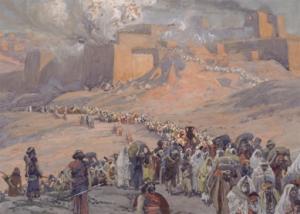(Lectionary for February 4, 2018)
 This very familiar and much beloved passage should raise in us far more than warm feelings of the pleasurable presence of God when we are feeling particularly low about one modern thing or another. Maybe our energy is not up to snuff, making our workout less than satisfactory. Or maybe our too-boisterous toddlers have sapped us so much that we can hardly carry the laundry basket to our pristine laundry room, causing us a delay in that needed glass of Chardonay. Or perhaps our second car, that two-year old Lexus, has again signaled its need for service, and another four hours of our life have just been stolen at the dealership. Good thing we know Is.40:31! “But those who wait for YHWH shall renew their strength, they shall mount up with wings like eagles, they shall run and not be weary, they shall walk and not faint.” And if one is especially fortunate, the lovely tune to “Eagle’s Wings” will waft into our weary brain, and aid us into a calm place where that glass of wine can really do the trick.
This very familiar and much beloved passage should raise in us far more than warm feelings of the pleasurable presence of God when we are feeling particularly low about one modern thing or another. Maybe our energy is not up to snuff, making our workout less than satisfactory. Or maybe our too-boisterous toddlers have sapped us so much that we can hardly carry the laundry basket to our pristine laundry room, causing us a delay in that needed glass of Chardonay. Or perhaps our second car, that two-year old Lexus, has again signaled its need for service, and another four hours of our life have just been stolen at the dealership. Good thing we know Is.40:31! “But those who wait for YHWH shall renew their strength, they shall mount up with wings like eagles, they shall run and not be weary, they shall walk and not faint.” And if one is especially fortunate, the lovely tune to “Eagle’s Wings” will waft into our weary brain, and aid us into a calm place where that glass of wine can really do the trick.
I wax sarcastic, as I am from time to time wont to do. Each of these first-world scenarios can be exhausting for those who are so effected, but I do wish to suggest that Isaiah 40 was not written to generally comfortable and safe 21st century Americans who can anticipate eagerly their next vacation to a sunny resort. The nearly 2600-year-old words were spoken and incised/penned to Israelite exiles, trapped for more than 50 years in the world’s largest city, Babylon, awaiting some sort of miracle that would enable their escape and even better their return to their home, Jerusalem, a place only a small minority of them had ever seen. When Isaiah speaks of “mounting up with wings like eagles,” his hearers could only dimly imagine sprouting the necessary plumage to enable a 600-mile flight west to the city that had become fabled in their fondest dreams.
 These exiles had known only Babylon and its immediate environs, save the few elderly among them who had any memory of Jerusalem and its former glories. They knew nothing of Davidic kings, the wonder of the Temple, the prized soil of the land promised by YHWH so long ago to the patriarch, Abram, and his wife, Sarai. Their eyes have been filled with the stunning vistas of Babylon, its gigantic tower, Etemananki, on the top of which resided the statue of Marduk, victorious city god of the metropolis, along with the fabulous hanging gardens of the king’s palace, a second-story park of rich plants and astonishing animals adorning the residence of the unconquerable Nebuchadnezzar and his successors. Any hope of escape from such a place seemed absurd, until one day the astounding entrance into the city by the army of the Persians, headed by Cyrus the Great, changed everything! The mighty Babylonians suddenly were no longer mighty at all, and the world the exiles had known became Persian practically overnight. And the tiny enclave of former Judeans, ensconced by the river Chebar at a site they named Tel-Aviv, found themselves packing up their goods to begin a trek back to their former homeland.
These exiles had known only Babylon and its immediate environs, save the few elderly among them who had any memory of Jerusalem and its former glories. They knew nothing of Davidic kings, the wonder of the Temple, the prized soil of the land promised by YHWH so long ago to the patriarch, Abram, and his wife, Sarai. Their eyes have been filled with the stunning vistas of Babylon, its gigantic tower, Etemananki, on the top of which resided the statue of Marduk, victorious city god of the metropolis, along with the fabulous hanging gardens of the king’s palace, a second-story park of rich plants and astonishing animals adorning the residence of the unconquerable Nebuchadnezzar and his successors. Any hope of escape from such a place seemed absurd, until one day the astounding entrance into the city by the army of the Persians, headed by Cyrus the Great, changed everything! The mighty Babylonians suddenly were no longer mighty at all, and the world the exiles had known became Persian practically overnight. And the tiny enclave of former Judeans, ensconced by the river Chebar at a site they named Tel-Aviv, found themselves packing up their goods to begin a trek back to their former homeland.
How had this occurred? How had the Judean exiles become now pilgrims on the road to a new destiny in the sacred soil of Israel? It was, of course, the work of YHWH, the creator of all that is and all that ever will be. Thus does Isaiah, that loquacious prophet of the exile, speak of Israel’s God, creating images of that God that have nourished and amazed countless readers and believers ever since. Listen again to some of his ringing phrases: “It is the One who sits above the circle of the earth, its inhabitants like grasshoppers, who stretches out the skies like a curtain, spreads them like a tent to live in” (Is.40:22); “To whom then will you compare me—who is my equal? says the Holy One. Lift up your eyes on high and look: who created these? YHWH who brings out their host and counts them, calling them all by name; because God is great in strength and mighty in power, not one is missing” (Is.40:26); “YHWH is the everlasting God, the creator of the ends of the earth. YHWH does not faint or grow weary; God’s understanding is unsearchable” (Is.40:28). How many believers have turned to these images in time of desperate need?
However, I would argue that until we examine our own modern exiles, we cannot fully appropriate just what sort of God the ancient prophet is offering us. Surely, we can admit that we are not in “exile” when we are deprived of a glass of wine by the demands of our children or forced to take our second car to the dealership for service. It is crucial, I think, that we identify in more precise ways just how we are in exile in our day.
I would say that we are in exile from our expectations of the world around us. Those of us of some age—and I am one of those—can remember how we hoped the world would be as we grew older in it, how our unity and care for one another would grow, how justice would spring up among us, leading to an increasingly more humane planet. I had these hopes when I was younger. Now I see a President Trump (how I am appalled to put those two words together!) unravel as much hopeful progress as he can, from climate change, to immigration reforms to tax policy to criminal justice, and on and on. Our exile is from common sense, but more importantly from equity and justice for all. In each of those named concerns, and also a host of unnamed ones, it is not justice that drives this president’s moves, but rather greed and revenge and a petty small-mindedness. Yes, we are in exile, you and I, and because that is all too true, we need a God the size of the one posited by Isaiah. We need desperately to name our exile from the hopes and demands of our Christian faith in order to turn to the God of Isaiah, the God of all exiles.
Now I see a President Trump (how I am appalled to put those two words together!) unravel as much hopeful progress as he can, from climate change, to immigration reforms to tax policy to criminal justice, and on and on. Our exile is from common sense, but more importantly from equity and justice for all. In each of those named concerns, and also a host of unnamed ones, it is not justice that drives this president’s moves, but rather greed and revenge and a petty small-mindedness. Yes, we are in exile, you and I, and because that is all too true, we need a God the size of the one posited by Isaiah. We need desperately to name our exile from the hopes and demands of our Christian faith in order to turn to the God of Isaiah, the God of all exiles.
And before any of us may “mount up with wings as eagles,” we must admit to ourselves that we, Icarus-like, have too often sewn our own waxen wings and attempted to challenge the skies, only to court a disastrous and possibly fatal fall into the sea. We are equally in exile from our own best self, that self called out by Jesus to self-denial and cross taking. Before we can receive the eagle wings of God, we need to discard and eschew our flawed wings, those self-constructed appendages that have ironically led us to our exiles. We must say that we are helpless exiles before we can read Is.40 with the clear idea that we actually need God in our exilic lives. Until we do that task of honest self and world examination, the God of Isaiah will be reduced to a God in our image, one who comes at our beck and call, who is plainly not the God who creates and sustains all that is and all that will be. Exiles need that God, and we, you and are, are exiles.
(Images from Wikimedia Commons)











